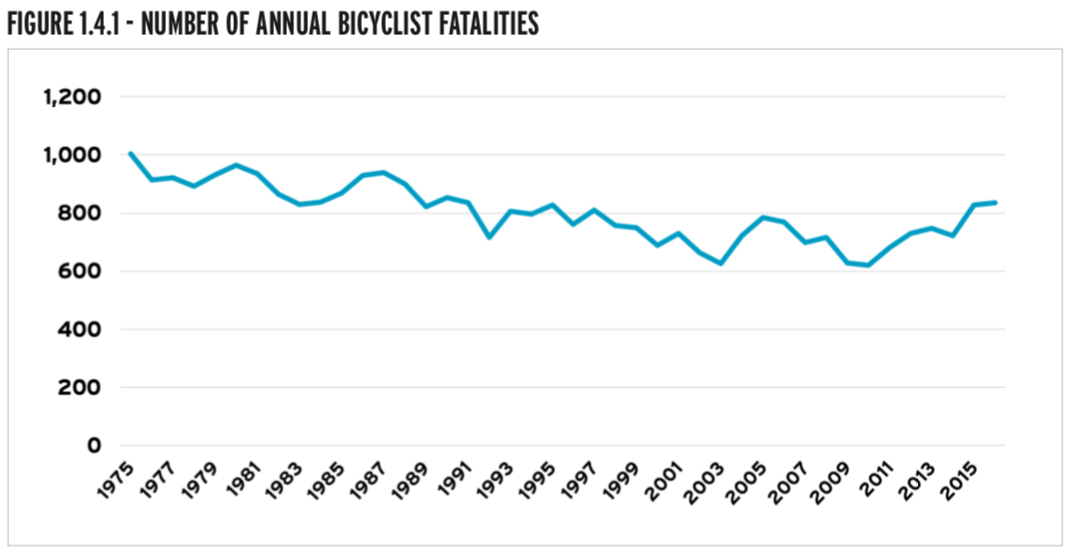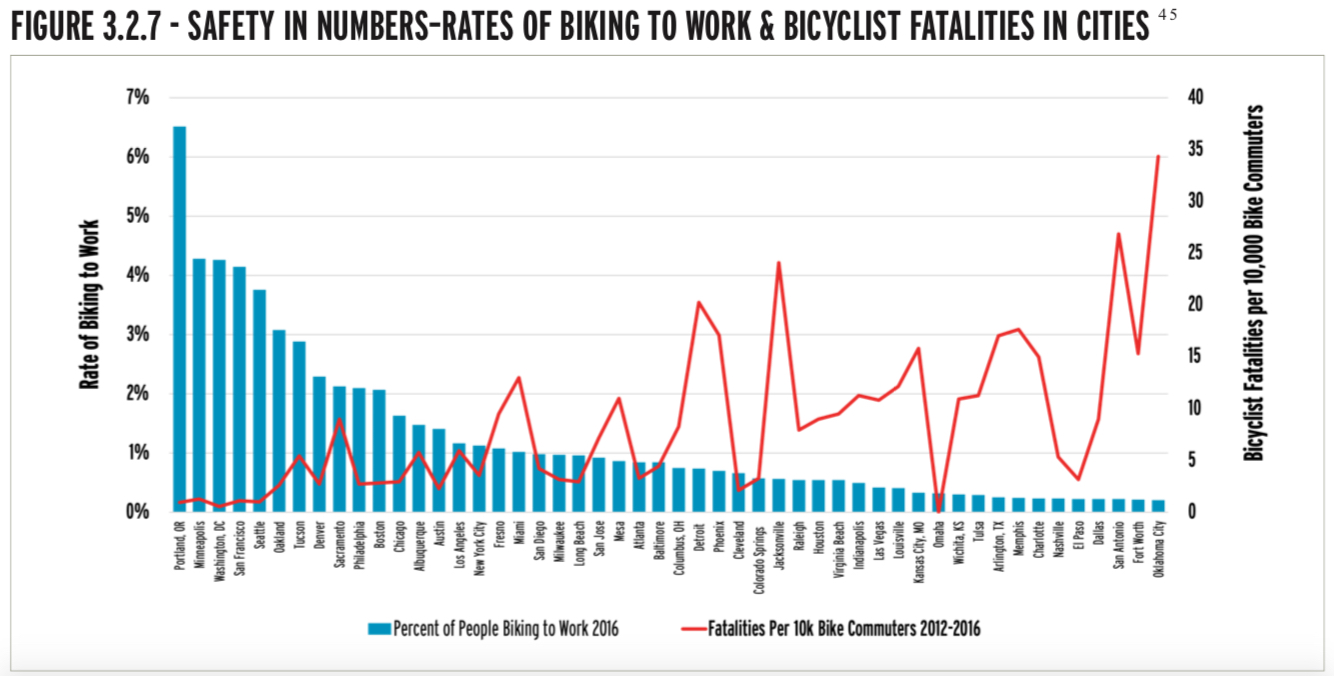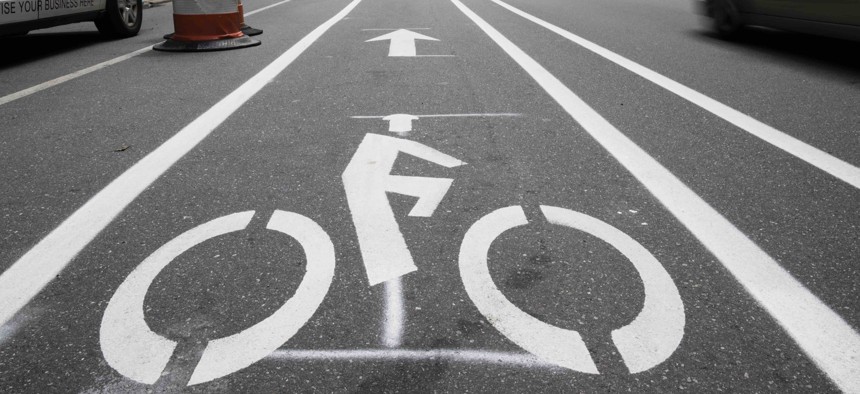Connecting state and local government leaders
"Fatalities are at a 25-year high," says one expert.
Bicyclist deaths in the U.S. recently reached a level not seen in over two decades, according to new research.
There were 835 cyclists killed in 2016, the most since 1991 when the figure was 836, the League of American Bicyclists says in the report. Cyclist fatalities in the 2009 to 2010 timeframe were closer to 600 annually, but have been creeping upwards since then.
The research also noted pedestrian fatalities were up in 2016, when 5,987 were killed, the highest since 1990 when the figure was 6,482.
"I think it's certainly the most jarring takeaway from the report," said Ken McLeod, policy director at the League. "We see a lot of effort and interest for both bicycling and walking but unfortunately, at the end of the day," he added, "fatalities are at a 25-year high."

The number of people who died in motor vehicle crashes in the U.S. in 2016, including motorists, cyclists and pedestrians, was 37,461.
Versions of the report released this week have been issued every couple of years since 2007. Over that time, there's been a 50 percent rise in the rate of people biking to work, based on estimates from the American Community Survey.
But an increase in bike commuting may not entirely explain the uptick in cyclist fatalities. Some places, like Oregon, have seen growth in bicycle commuting while cyclist fatality rates there have fallen. In contrast, many cities that have the lowest percentages of bike commuters also have the highest rates of cyclist deaths.
One possible explanation for this is that where there are more cyclists and pedestrians, motorists are apt to be aware of other road users. Infrastructure like bike lanes and sidewalks likely plays a part as well. But its hard to know the relative importance of these factors, the report adds.
States in the south were among the worst performers when it comes cyclist safety, according to the report.
For example, Mississippi, Alabama, Arkansas and South Carolina all had cyclist fatality rates that averaged over 25 per 10,000 bike commuters between 2012 and 2016. In each of these states, 0.2 percent or less of commuters biked to work in 2016. That's compared to states like California, Colorado, Idaho, Montana and Oregon, where between 1 and 2.2 percent of commuters relied on bikes.

The report points to research showing that infrastructure that slows traffic and separates cyclists from traffic and pedestrians reduces the risk of injuries for bicyclists. This research suggests such separated paths are safer than painted lanes or arrows marking a bike route.
Higher speed crashes also tend to result in worse injuries for everyone involved, the report adds.
Other factors that could be contributing to the rise in cyclist and pedestrian fatalities include more heavy passenger vehicles, like sport utility vehicles, on roadways, and an uptick in the number of miles that Americans are driving in the years since the Great Recession.
McLeod said data on how much distracted driving has fueled the problem is somewhat limited.
Among the report's other findings: 71 percent of cyclist deaths in 2016 were in urban areas and 61 percent were on arterial roadways.
The League advocates for a number of actions to improve the safety of bicyclists.
These include laws to establish safe distances for motorists to maintain when passing cyclists, the adoption of "complete streets" policies, and the implementation of bike and pedestrian master plans.
But McLeod says a key step toward improving safety is building infrastructure that cuts down on the odds motorists will come into contact with cyclists, particularly in cities, but also in suburban and rural corridors that see frequent bike traffic.
Federal dollars flowing toward bike and pedestrian projects have increased in recent years, and averaged $832 million annually between 2013 and 2017. As for why fatalities are up in spite of this, McLeod said funding levels might still might be inadequate.
The report says about $3.7 billion in federal transportation funds were obligated for bike and pedestrian projects between fiscal years 2012 and 2016, amounting to about 1.9 percent of federal transportation funding during that time and a per capita level of about $2.36.
"It's actually a pretty small figure," McLeod said. "It's possible we just aren't making enough investment to make an impact."
In some places voters have approved local bond measures for bike and pedestrian projects, the report notes. But it adds that some local governments are restricted by state law when it comes to raising the local tax revenues needed to repay borrowed money.
One mechanism the report mentions as an option for raising revenue for projects is a special tax on the sale of bikes.
It says Oregon is the only state with this tax in place, but that Hawaii has a $15 one-time bicycle registration fee. Equity issues come into play here, the report adds, because lower-income people are more likely to bike or walk to work. Oregon's law exempts bicycles from the tax if they have a retail price under $200.
The full report from the League of American Bicyclists, titled "Bicycling & Walking in the United States" and released Friday, is 417 pages and covers a range of issues beyond safety. A full copy can be found here.
Bill Lucia is a Senior Reporter for Route Fifty and is based in Washington, D.C.

NEXT STORY: ‘At-Risk’ Railroads Hit Safety Equipment Deadline, Officials Say




